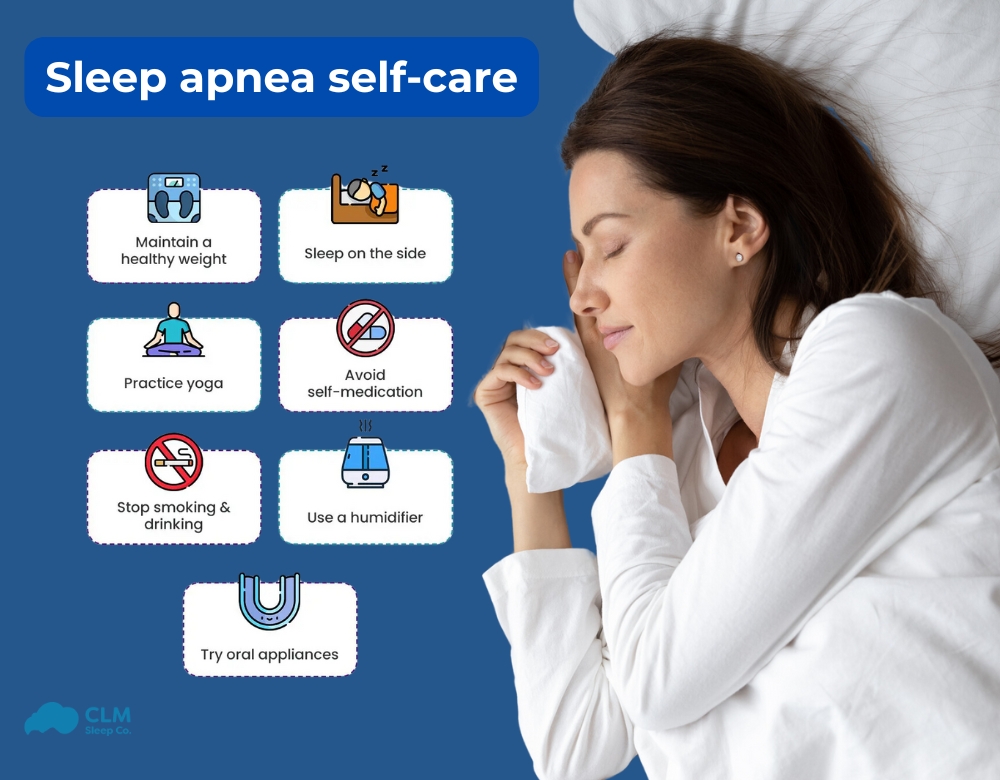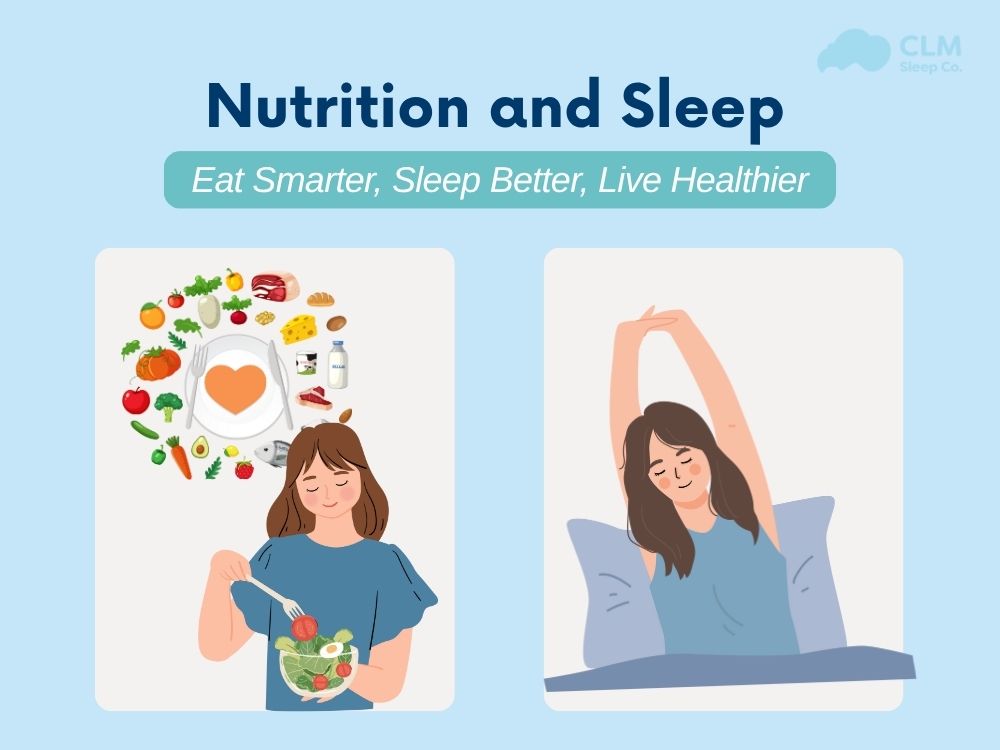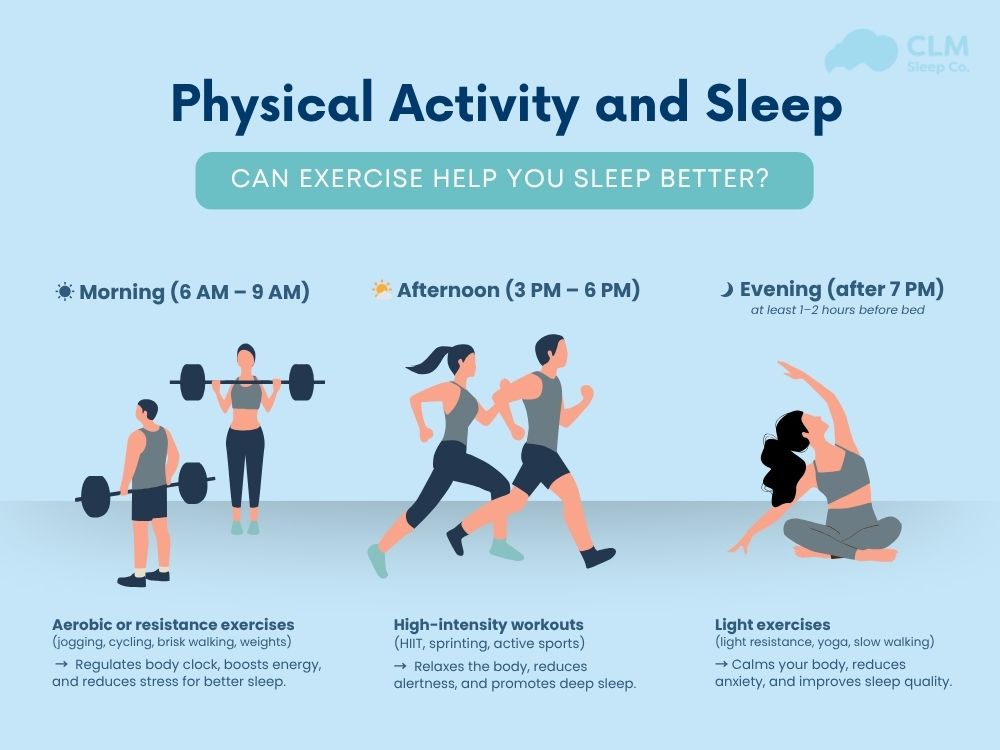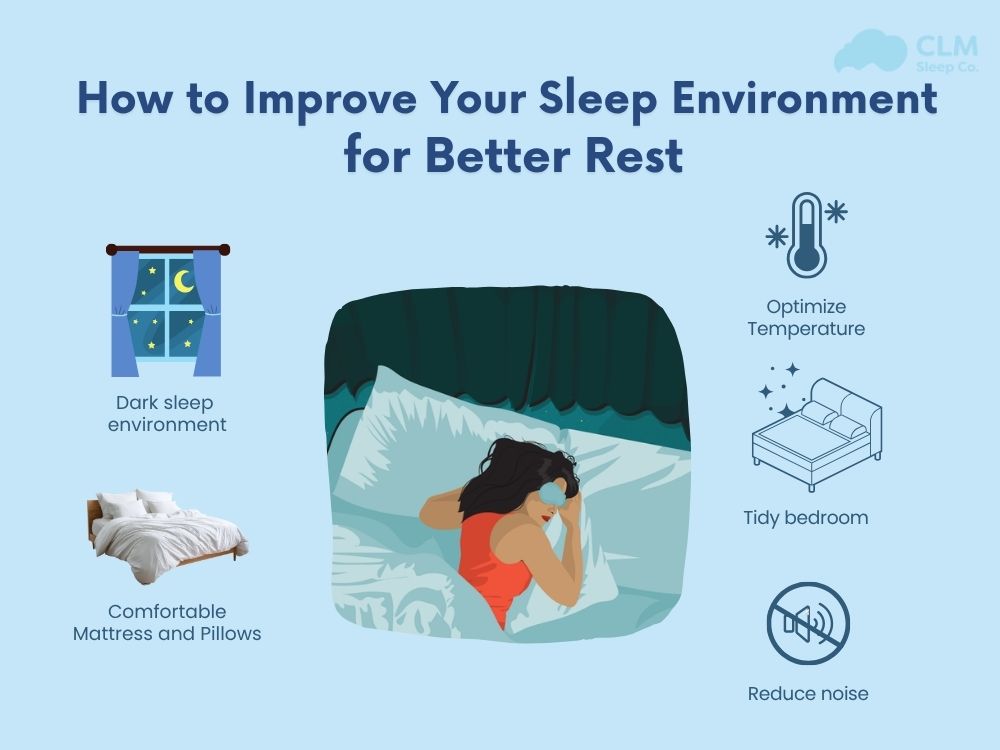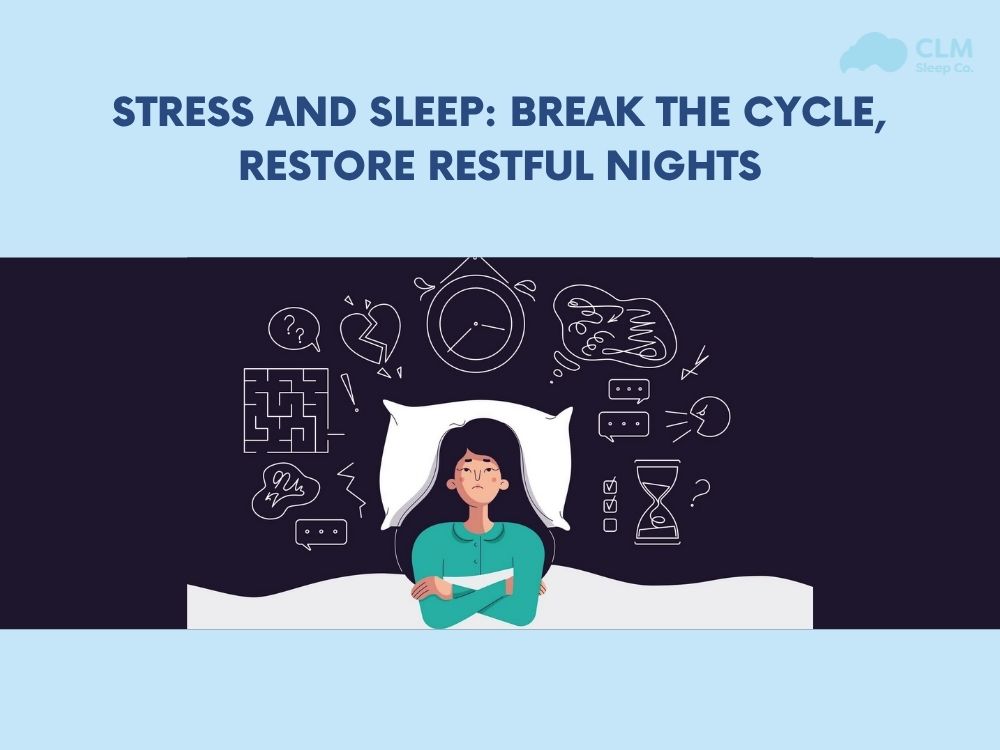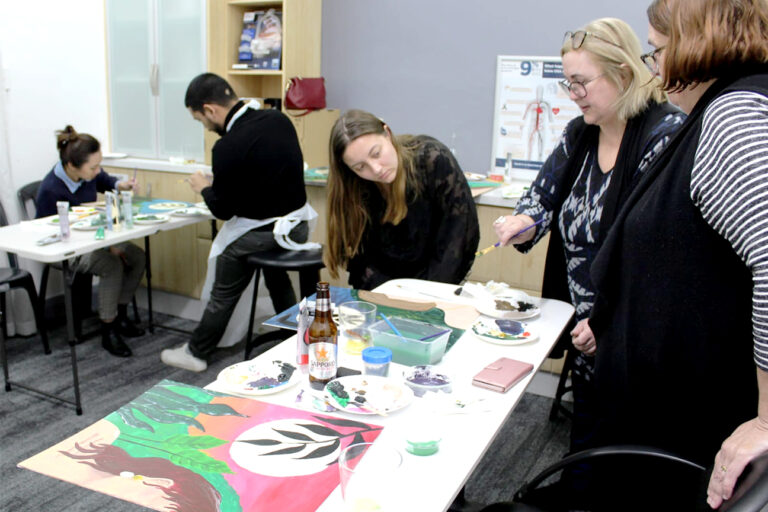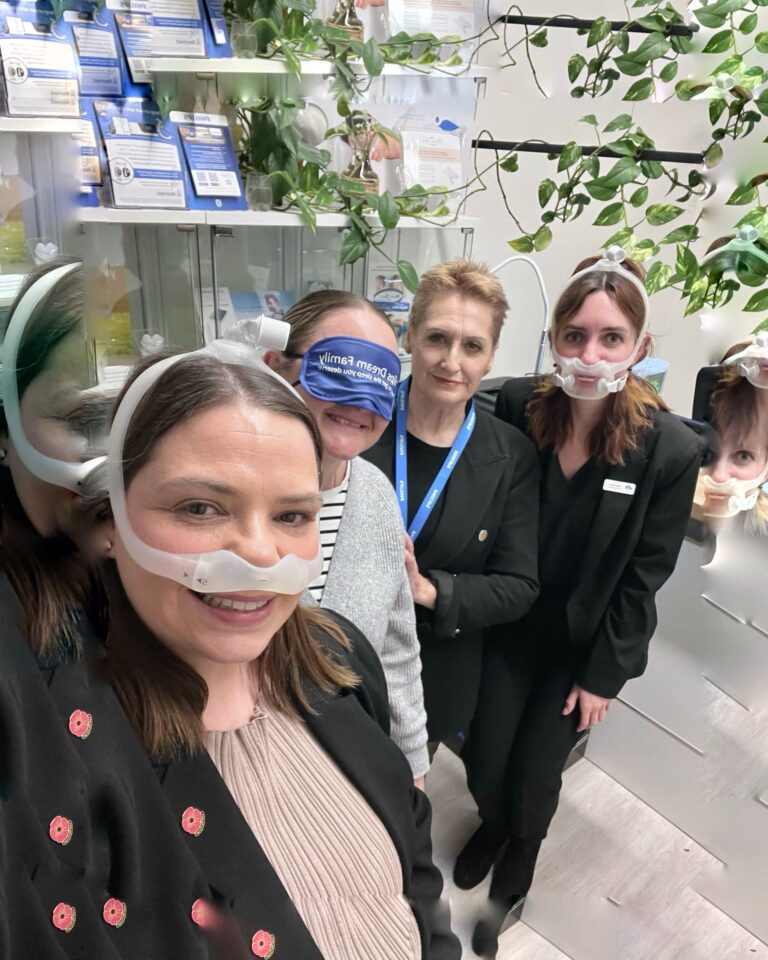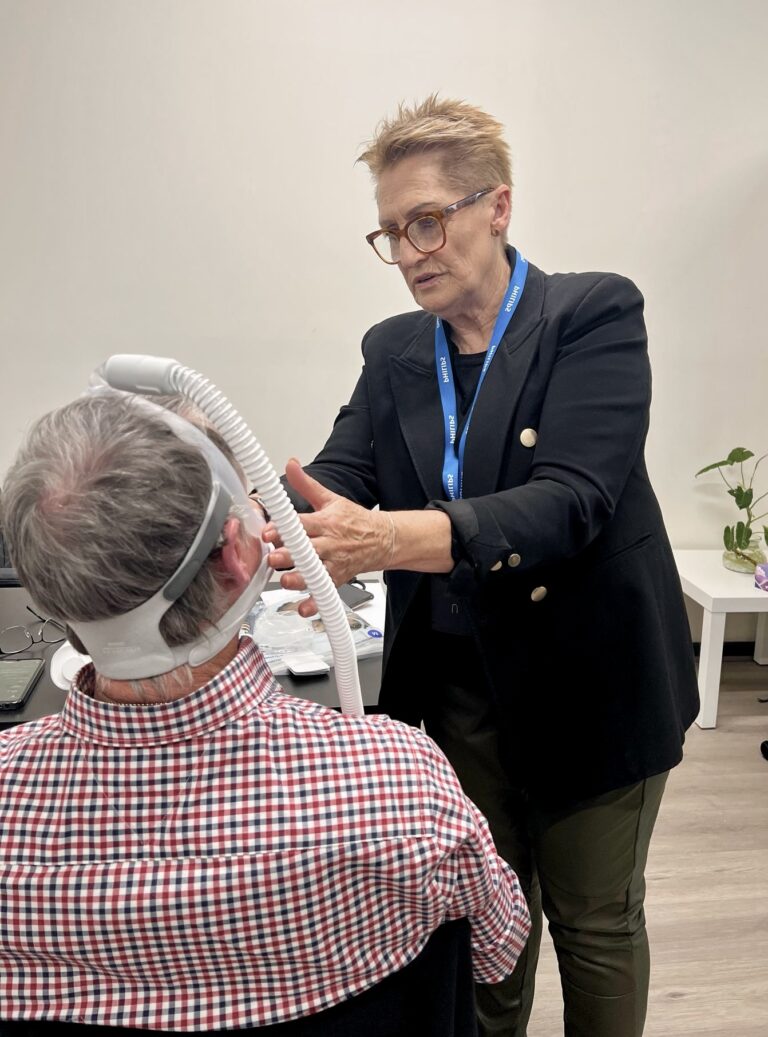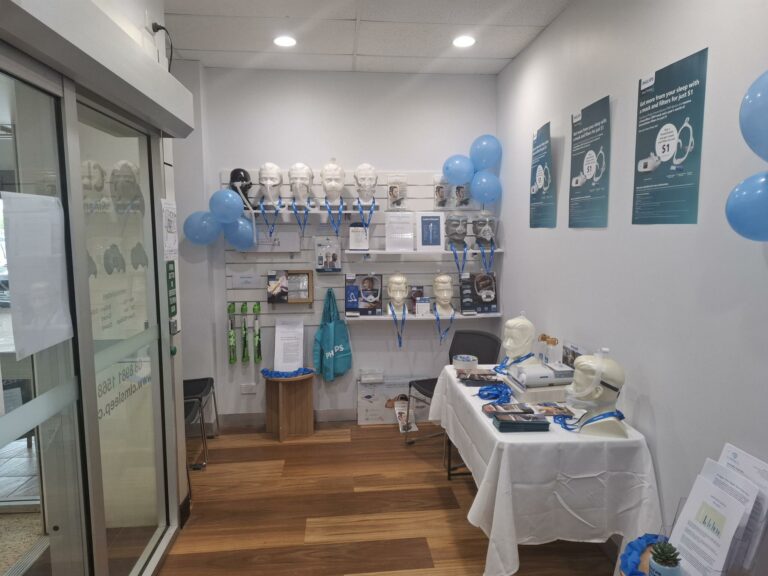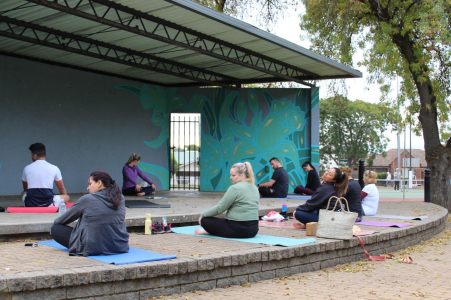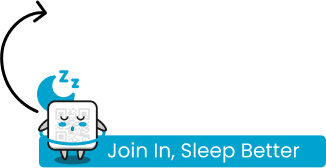Sleep apnea is a common but serious disorder that, if left untreated, can affect overall health. Alongside medical treatment, you can take several self-care measures to manage symptoms and improve sleep. Lifestyle changes such as maintaining a healthy weight, adjusting your sleep position, relaxing before bedtime, and avoiding alcohol can significantly help. The comprehensive sleep apnea self-care guide in the following article by CLM Sleep will assist you in managing sleep disorders and achieving better sleep.
See more: Guide to Sleep Apnea Test At Home: Quick and Easy
Maintain a Healthy Weight
Doctors often recommend weight loss as one of the sleep apnea self-care strategies, as obesity, especially in the upper body, can increase the risk of airway obstruction and nasal congestion. These blockages can lead to sudden or prolonged episodes of apnea during sleep.
Maintaining an ideal weight helps keep the airway clear and reduces sleep apnea symptoms. According to some studies, weight loss in obese individuals can decrease the need for airway surgery or long-term CPAP therapy.
In some cases, weight loss can completely eliminate sleep apnea, but the condition may recur if the weight is regained. Some effective weight loss strategies include:
- Limiting the consumption of processed foods and fast food.
- Engaging in regular physical activity, at least 30 minutes per day.
- Reducing sugary drinks in the daily diet.

Adopt a Consistent Sleep Schedule
Maintaining a consistent sleep routine helps regulate the body’s circadian rhythm. Try to go to bed and wake up at the same time every day, even on weekends. During vacations, you can adjust your routine or use relaxation techniques to manage sleep apnea. This consistency can enhance sleep quality and make it easier for you to fall asleep and wake up.
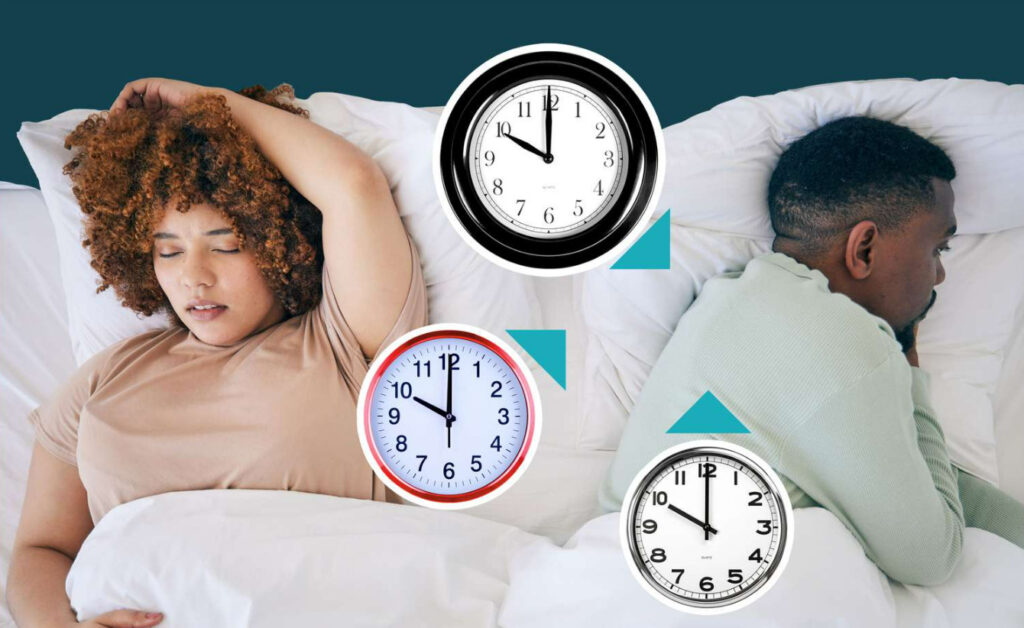
Change Your Sleep Position
Altering your sleep position can be a small but effective change in reducing sleep apnea symptoms and improving sleep quality. Studies show that sleeping on your back can worsen symptoms while sleeping on your side can help improve breathing. Here are some useful tips:
- Sleep on your side, especially the left side, to help keep the airway clear and reduce blockages, limiting sleep apnea episodes.
- Avoid sleeping on your back: Gravity can narrow the airway in this position. Using pillows or support devices can help prevent rolling onto your back.
- Elevate your head: Use an adjustable bed or extra pillows to elevate your head, which helps improve airflow and reduce snoring.
- Positional therapy: Using a wedge pillow or anti-snoring pillow can encourage side sleeping, minimizing the risk of sleep apnea.
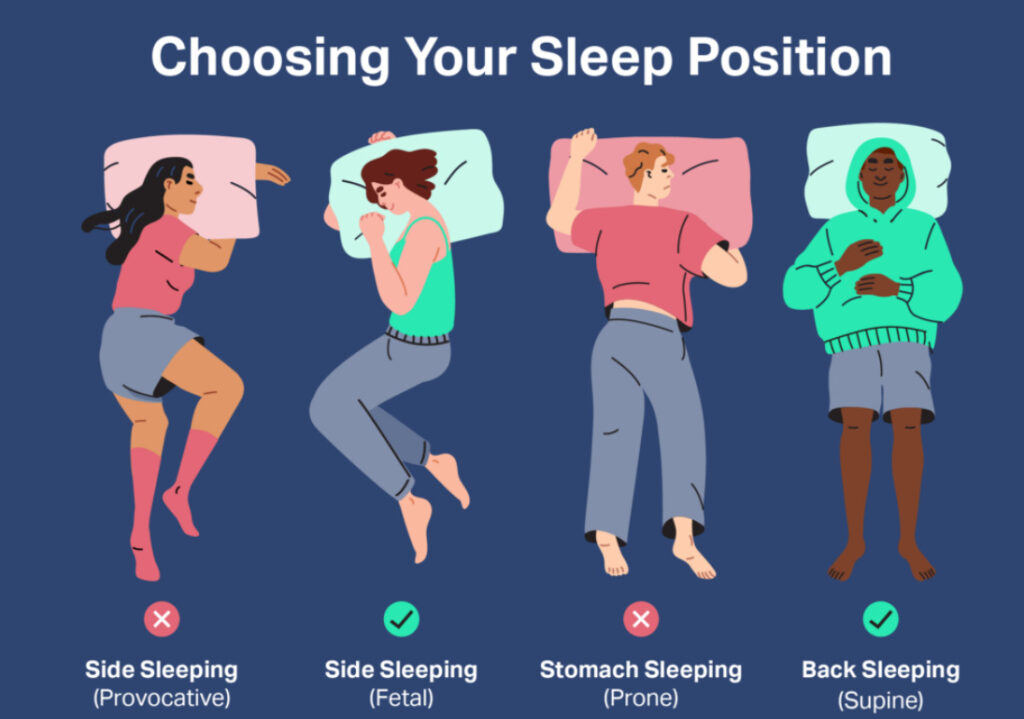
Read more: How to stop snoring
Avoid Alcohol and Sedatives
Lifestyle changes are important in improving overall health and supporting better sleep quality. To reduce the risk and complications of sleep apnea, you should consider sleep apnea self-care, such as quitting smoking and limiting sedative consumption.
- Alcohol can relax the muscles in the throat, leading to snoring and sleep disruptions. Additionally, alcohol causes inflammation and narrows the airways, obstructing airflow.
- Similarly, sedatives such as sleeping pills and anti-anxiety medications cause excessive relaxation of the muscles that keep your airway open, increasing the likelihood of airway obstruction.

Quit Smoking
Cessation of smoking may help lower the chances of developing sleep apnea for a person who doesn’t have the condition yet. For a diagnosed patient, quitting smoking does not cure the disorder. However, quitting can relieve some of its symptoms and decrease its severity, therefore helping in improved respiratory health and better quality of sleep overall.
If you find it difficult to stop smoking, ask for help without shame. Numerous communities run free programs to help people quit smoking. It can also be effective in controlling the craving for products such as nicotine patches or gum. The best help can be created by having a definite quit date and informing your family and friend circle that promises to ensure the deep commitment and offer additional enthusiasm for success.

Manage Nasal Congestion
Clear your blocked nasal passages each night for improved sleep, especially if you have mild sleep apnea. Keep the place you sleep clean and free from allergens by washing bed linens frequently and vacuuming thoroughly.
If nasal congestion is a chronic problem overnight, a saline nasal spray may be used to eliminate any problems of immediate need for breathing. Also, keeping a humidifier running in the bedroom helps to keep the airspace moist and lightens congestion throughout the duration, promoting better respiration during the night.
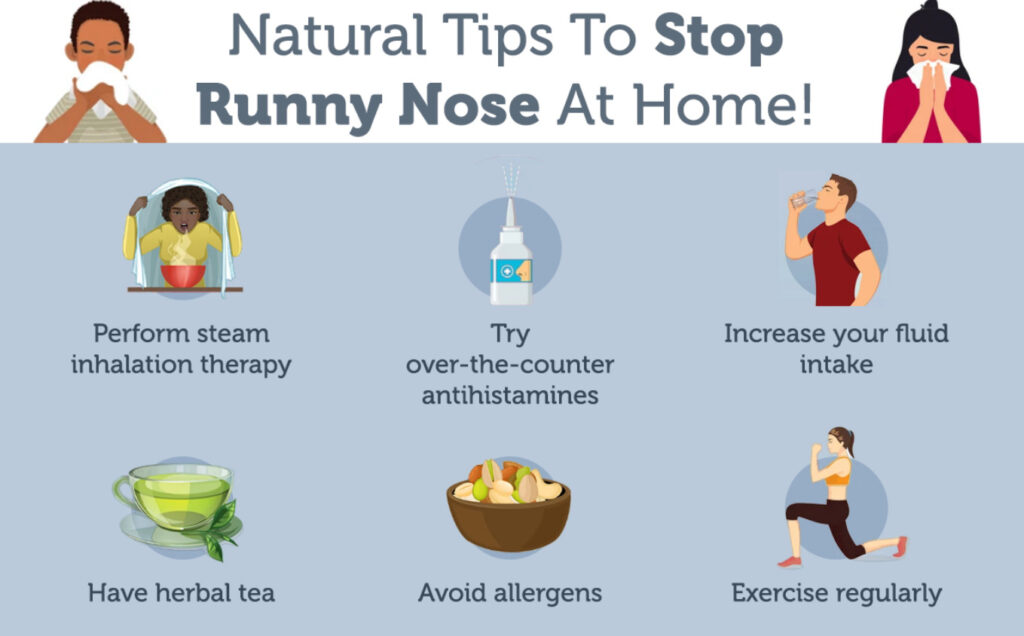
Exercise Regularly
Regular exercise boosts energy, improves cardiovascular health, and it can also help manage sleep apnea. Yoga is particularly beneficial as it strengthens respiratory muscles and improves oxygen flow throughout the body.
Apnea is usually related to decreases in blood oxygen levels. Yoga, by its breathing exercises, helps in gaining control of the saturation of oxygen in our blood.
Begin with basic yoga exercises that will enhance your breathing techniques. There are several videos and apps that offer beginner-friendly yoga sessions. Choose any of these and allocate 10-15 minutes of your time each day for the practice. Do this for some time, and soon you will notice an appreciable improvement in respiratory function.
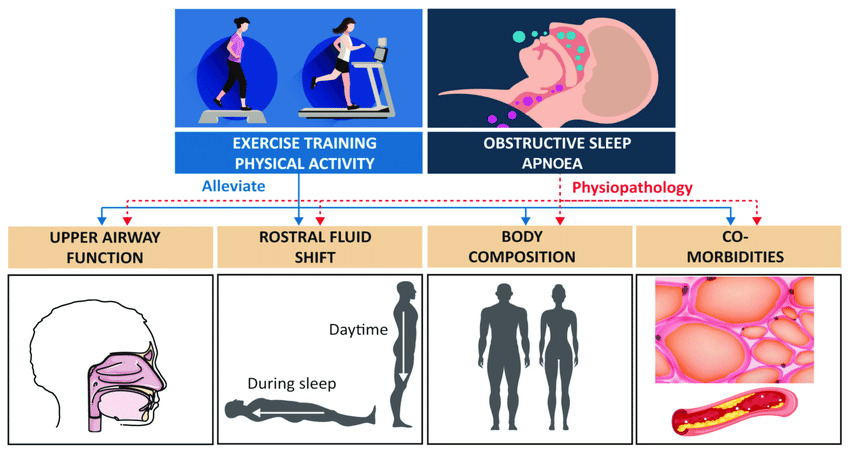
See more: Can Sleep Apnea Kill You? Risks and Consequences
Use a Humidifier
The humidifier increases the moisture content of the air, causing less dryness and irritation in the air passages. Since there is more humidity in the air, the airways become clearer for easier breathing, and the feeling of congestion is reduced.
However, to work properly and be safe, clean the humidifier as recommended by the manufacturer to avoid an accumulation of bacteria and mold, which is unhealthy.
Optimize Your Sleep Environment
Optimizing your sleep environment is important for managing sleep apnea and improving sleep quality. Here are some sleep apnea self-care tips to create an ideal sleep space:
- Keep the bedroom clean and allergen-free by regularly washing bed linens and vacuuming.
- Maintain a cool temperature (16-19°C or 60-67°F) and darkness to promote melatonin production and support deep sleep.
- Reduce noise by using earplugs or a white noise machine.
- Choose supportive mattresses and pillows to help maintain proper body alignment.
- Consider using a wedge pillow to maintain a side-sleeping position, reducing sleep apnea symptoms.
Creating an ideal sleep environment will help you sleep better and effectively manage sleep apnea.
Monitor Your Sleep
Monitoring your sleep is an essential sleep apnea self-care method for improving sleep quality. Keeping track of sleep patterns and symptoms helps you better understand the impact of this condition on your overall health. Here are some effective ways to monitor your sleep:
- Keep a Sleep Diary: Record your bedtimes, wake-up times, the number of times you wake up at night, naps taken, and how you feel upon waking. This diary helps identify patterns and factors that may exacerbate sleep apnea.
- Use Sleep Tracking Devices or Apps: Wearable devices or smartphone apps can track sleep duration, quality, and movements during the night.
- Note Symptoms and Influencing Factors: Track symptoms such as snoring, gasping for air, and daytime sleepiness, along with diet, exercise, and stress levels.
- Schedule Regular Doctor Visits: Share your sleep diary with your doctor during appointments to adjust your treatment plan as needed.
- Evaluate Treatment Efficacy: If you are using a CPAP machine or other treatments, note any improvements in symptoms and sleep quality.
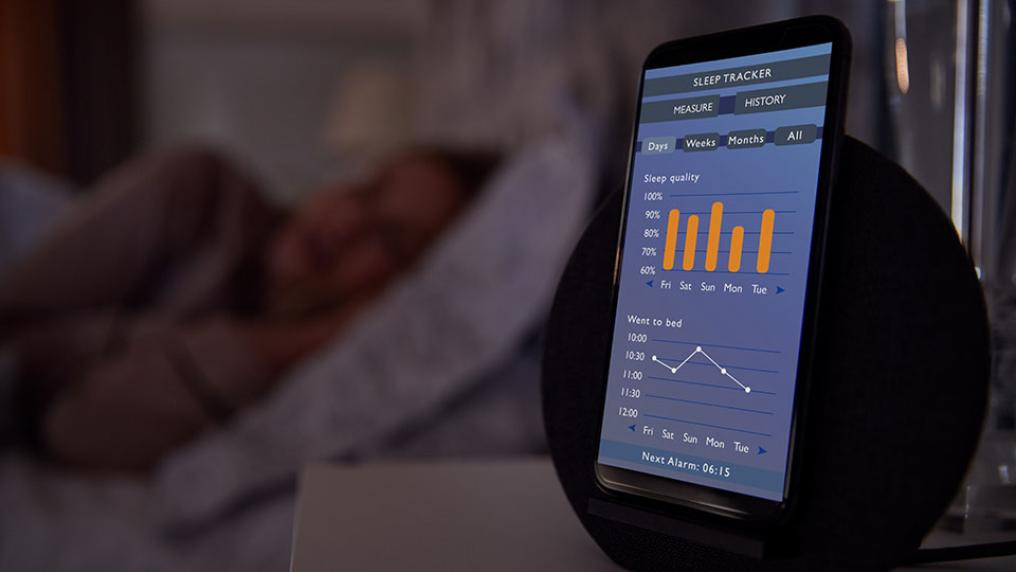
See more: How to Prevent Sleep Apnea
Practice Relaxation Techniques
Practicing relaxation techniques is an effective sleep apnea self-care method for improving sleep quality. Stress and anxiety can exacerbate symptoms of sleep disorders, so incorporating relaxation methods into your daily routine can improve sleep quality. Here are some relaxation techniques to try:
- Deep Breathing Exercises: Inhale through your nose for four counts, hold for four counts, and exhale slowly through your mouth for six counts. Repeat several times to help reduce stress.
- Meditation and Mindfulness: Sit in a quiet place, focusing on your breath or a specific mantra. Apps like Headspace or Calm can support you in the meditation process.
- Gentle Yoga or Stretching: Practicing gentle yoga, such as Child’s Pose or Legs-Up-the-Wall Pose, helps reduce tension and prepare for sleep. Focus on deep breathing in each pose.
- Listening to Soothing Music or Sounds: Soft music or nature sounds can help relax the mind and body, facilitating deeper sleep. Create a playlist of your favorite soothing songs, or use a sound machine that plays white noise, rain, or ocean sounds.
Limit Caffeine and Heavy Meals Before Bed
Limiting caffeine and avoiding heavy meals before bed are effective self-care strategies for managing sleep apnea. Both factors can negatively impact sleep quality and increase symptoms. Here’s how to implement these strategies:
– Reduce Caffeine Intake:
Caffeine is a stimulant that can hinder your ability to fall asleep and stay asleep, leading to increased nighttime awakenings.
Recommendations:
- Avoid caffeine in the afternoon and evening, ideally stopping consumption at least 6 hours before bedtime.
- Opt for caffeine-free beverages, such as herbal tea, in the evening.
– Avoid Heavy Meals:
Eating a hearty dinner can cause indigestion and acid reflux, disrupting sleep and exacerbating sleep apnea symptoms.
Recommendations:
- Your last meal should be at least 2-3 hours before bedtime to give your body enough time to digest.
- Choose light, easily digestible meals, such as whole-grain crackers with hummus or a small salad with grilled chicken.
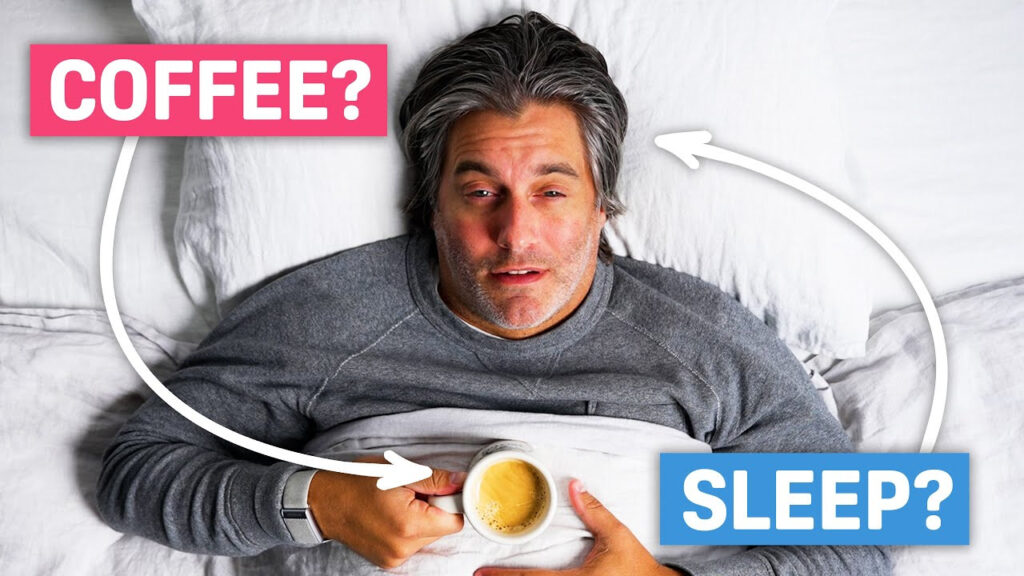
When to Seek Professional Help
Some sleep apnea self-care and lifestyle changes can help reduce symptoms of sleep apnea. However, traditional treatment methods should not be overlooked. Prescription medications and even surgery may be necessary as part of the treatment plan for this condition.
Discuss your treatment options with your doctor before trying alternative methods. If your symptoms worsen, seek medical attention immediately.
Conclusion of the article
A comprehensive strategy combining sleep apnea self-care and medical intervention is essential to effectively managing sleep disorders. Implementing lifestyle changes such as maintaining a healthy weight, optimizing your sleep environment, and incorporating relaxation techniques can significantly reduce symptoms and improve sleep quality. Remember, proactive self-care efforts not only enhance your sleep experience but also promote overall health. If symptoms worsen or you have concerns about your sleep, seek medical advice. You can control sleep apnea and enjoy restful, restorative sleep with the right approach.
Are you ready to enhance your sleep quality? At CLM Sleep, we provide straightforward and effective Diagnostic and Treatment services tailored for the people of Australia. Let us be your trusted partner in your journey to achieving restorative and complete sleep. Reach out today and take the first step towards better sleep!
